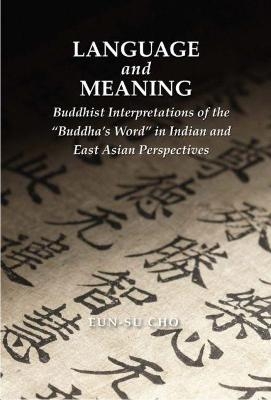
Language and Meaning
Buddhist Interpretations of the "Buddha’s Word" in Indian and East Asian Perspectives
Seiten
2020
Numata Center for Buddhist Translation & Research. (Verlag)
978-1-886439-81-8 (ISBN)
Numata Center for Buddhist Translation & Research. (Verlag)
978-1-886439-81-8 (ISBN)
- Titel ist leider vergriffen;
keine Neuauflage - Artikel merken
Comparing Abhidharma and Chinese Buddhist conceptions of the Buddha’s word, Eun-su Cho’s study addresses the transmission and reinterpretation of theories of language and opens a doorway to Buddhist philosophical thought in East Asia. This is important because technical Buddhist philosophical thought in East Asia has long been neglected.
The nature of the Buddha’s speech, buddhavacana, has been discussed by Buddhist thinkers from soon after the Buddha’s lifetime. In modern Buddhist scholarship it seems natural to focus on the textual record of the Buddha’s teachings, but overemphasizing that aspect risks losing sight of the potency of the Buddha’s speech to effect liberation. Comparing Abhidharma and Chinese Buddhist conceptions of the Buddha’s word, Eun-su Cho’s study addresses the transmission and reinterpretation of theories of language and opens a doorway to Buddhist philosophical thought in East Asia. This is particularly important because technical Buddhist philosophical thought in East Asia has long been neglected, and has become overshadowed by academic and popular attention to Tibetan Buddhist philosophical thought. In contrast to the perception of greater legitimacy accorded to Tibetan thought through its association with Indian Buddhism, the doctrinally dense works of East Asian Buddhism have not been the object of equally intense study, yet such works exist and continue to deserve greater attention. Cho’s Language and Meaning offers an important pathway into these discourses.
The nature of the Buddha’s speech, buddhavacana, has been discussed by Buddhist thinkers from soon after the Buddha’s lifetime. In modern Buddhist scholarship it seems natural to focus on the textual record of the Buddha’s teachings, but overemphasizing that aspect risks losing sight of the potency of the Buddha’s speech to effect liberation. Comparing Abhidharma and Chinese Buddhist conceptions of the Buddha’s word, Eun-su Cho’s study addresses the transmission and reinterpretation of theories of language and opens a doorway to Buddhist philosophical thought in East Asia. This is particularly important because technical Buddhist philosophical thought in East Asia has long been neglected, and has become overshadowed by academic and popular attention to Tibetan Buddhist philosophical thought. In contrast to the perception of greater legitimacy accorded to Tibetan thought through its association with Indian Buddhism, the doctrinally dense works of East Asian Buddhism have not been the object of equally intense study, yet such works exist and continue to deserve greater attention. Cho’s Language and Meaning offers an important pathway into these discourses.
| Erscheinungsdatum | 13.09.2021 |
|---|---|
| Reihe/Serie | Contemporary Issues in Buddhist Studies |
| Verlagsort | Berkeley |
| Sprache | englisch |
| Maße | 152 x 229 mm |
| Gewicht | 425 g |
| Themenwelt | Geisteswissenschaften ► Philosophie ► Östliche Philosophie |
| Geisteswissenschaften ► Religion / Theologie ► Buddhismus | |
| ISBN-10 | 1-886439-81-8 / 1886439818 |
| ISBN-13 | 978-1-886439-81-8 / 9781886439818 |
| Zustand | Neuware |
| Haben Sie eine Frage zum Produkt? |
Mehr entdecken
aus dem Bereich
aus dem Bereich


